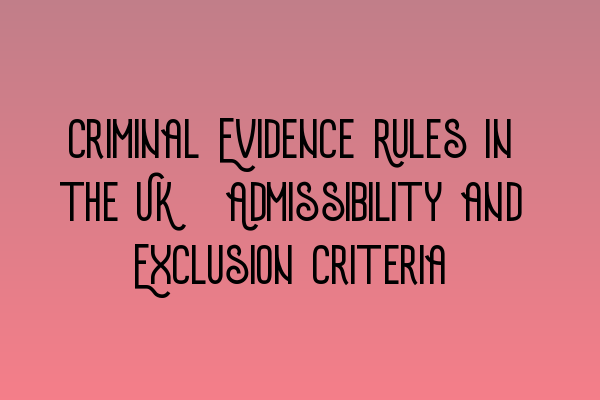Criminal Evidence Rules in the UK: Admissibility and Exclusion Criteria
As a criminal defense attorney specializing in UK law, it is crucial to have a comprehensive understanding of the criminal evidence rules. These rules govern the admissibility and exclusion of evidence in criminal proceedings, playing a pivotal role in the outcome of a case. In this blog post, we will delve into these rules and explore the criteria followed for determining the admissibility and exclusion of evidence. Understanding these rules is essential for both aspiring solicitors preparing for the SQE exams and practicing legal professionals.
Admissibility of Evidence
The admissibility of evidence refers to whether evidence can be presented to the court and considered by the judge or jury when making their decision. To assess the admissibility of evidence, the court follows certain criteria:
- Relevance: Evidence must be relevant to the issues in the case. It should have a logical connection to the facts in question and provide insight into the matter at hand. This ensures that only pertinent evidence is considered, preventing any distractions from the core issues.
- Reliability: Evidence must be reliable and trustworthy. This means that it should be credible and not misrepresent or skew the facts of the case. Factors such as the source of the evidence, its consistency, and whether it has been independently verified are taken into account to determine reliability.
- Public Policy Exclusions: Certain types of evidence may be excluded due to public policy considerations. This includes evidence obtained through illegal means or evidence that, if admitted, would undermine fundamental legal principles or public confidence in the justice system.
It is important for solicitors to thoroughly analyze the evidence they intend to present, ensuring its compliance with these criteria to maximize its admissibility in court.
Exclusion of Evidence
While certain evidence is admissible, there are circumstances in which evidence can be excluded from consideration. The court may exclude evidence under the following circumstances:
- Unfair Prejudice: If the probative value of the evidence is outweighed by its potential to unduly prejudice the accused or the fairness of the trial, the court has the power to exclude it. This prevents the jury from being influenced by irrelevant or highly prejudicial evidence.
- Improperly Obtained Evidence: Evidence that has been obtained unlawfully, such as through a breach of privacy or violation of human rights, may be excluded from consideration. This protects the accused’s rights and maintains the integrity of law enforcement practices.
- Hearsay: Hearsay evidence, which is a statement made outside of the court’s presence and offered for the truth of the matter asserted, is generally excluded. This is because it lacks the necessary reliability and verifiability required for admissibility.
By adhering to these exclusion criteria, the court ensures that only evidence meeting certain standards is considered in the decision-making process, promoting fairness and preserving the rights of the accused.
For aspiring solicitors, it is essential to have a solid understanding of these criminal evidence rules. Preparing for the SQE exams involves thorough knowledge of the subject matter, and resources such as SQE 1 Practice Exam Questions and SQE 1 Practice Mocks FLK1 FLK2 can greatly enhance your preparation.
Moreover, if you need assistance with SQE 2 or SQE 1 preparation, our SQE 2 Preparation Courses and SQE 1 Preparation Courses can provide you with comprehensive study materials and guidance.
It is crucial to stay updated with the latest SRA SQE Exam Dates to plan your studies effectively and register for the exams in a timely manner.
In conclusion, the admissibility and exclusion of evidence are vital aspects of criminal law in the UK. Solicitors must have a thorough understanding of the criteria for determining the admissibility and exclusion of evidence. By adhering to these rules, legal professionals can ensure a fair trial and protect the rights of the accused. Stay prepared and utilize the available resources to enhance your knowledge and skills in this critical area of criminal practice.
